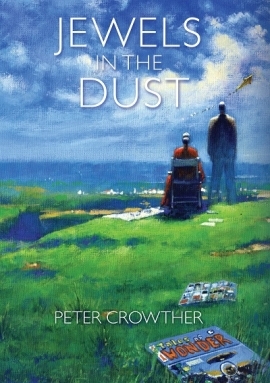I’d never read anything by Peter Crowther before Jewels in the Dust, a new collection of thirteen stories published between 1996 and 2006 and collected here for the first time. I was, however, very familiar with Crowther’s name, mainly as one of the founders of PS Publishing, the award-winning UK publisher that’s known for high-quality, collectible limited editions of SF and fantasy—somewhat similar to Subterranean Press on the other side of the Atlantic, come to think of it. (Subterranean also happens to be the publisher of this collection.)
Turns out that the person I mainly thought of as a publisher has actually written about half a dozen standalone novels, again as many short story collections, and has edited about twenty anthologies. I’ve got some catching up to do, it seems.
Jewels in the Dust collects thirteen stories and includes a generous set of story notes about the origins and writing process for each story. Most of the stories in the collection fall somewhere on the sliding scale of contemporary fantasy, magical realism, and horror, often featuring a life-changing event intersecting with something magical or supernatural. The trajectory of these stories is often similar to what someone like, say, Jonathan Carroll writes: the common lives of regular people thrown off-course by something that doesn’t neatly fit in reality.
What’s very different from Carroll, however, is the atmosphere. Peter Crowther often goes for a folksy, chatty sort of Americana style, with stories set in small towns in the middle of the previous century. Another parallel—especially in the two stories that open this collection, “The Bachelor” and “The Fairy Trap”—can be found in Ray Bradbury. In a small town, young boys are playing outside, and magic happens—a creeping, disturbing sort of magic that puts a weird spin on the life-affirming nostalgia.
After those two Bradbury-esque stories, the stories’ focus changes to adults, and inevitably more darkness creeps in. A story about a fighting couple confronted by the ghosts of happier times. A story about hopeful, talented musicians whose ambitions are derailed. Several stories about people on death’s doorstep, often dying of cancer.
By the time you reach the end of the collection—“Thoughtful Breaths,” a moving story about a dying man’s last actions before and after his death—it’s clear that Jewels in the Dust offers a journey, from youth through adulthood to, as one story’s title somewhat roughly puts it, the inevitable “Circling the Drain.” The focus on mortality is almost painful, from the title story with its terminal cancer patient who takes every opportunity to make her last days special, to “Things I Didn’t Know My Father Knew,” which the author calls not so much a story as a “catharsis” in the story notes.
The oddest thing about the collection is how straightforward all these stories are in terms of narrative technique. There’s an almost retro-like sensibility to them: stories deliberately written in an old-fashioned, conversational style, often somewhat rambly, as if you’re sitting down with someone who’s spinning his tale on the spur of the moment—someone who might start his tale with “Now looky here son, it was back in ‘45…” and then just takes it from there, side-bars and all. I suspect many of these stories would work very well in audio format, if delivered by the right narrator.
In the story notes, Peter Crowther mentions that he came up with the opening line for one of the stories and then sort of improvised the rest like “riffing on a piano or a guitar.” Many of the stories give off that vibe: a bit long-winded, a bit rambly, but always heartfelt. It’s a style you definitely have to be in the mood for. When the author starts waxing philosophical in the notes for one of the stories, he interjects “hey you, at the back…open your eyes: I’m still talkin’ here!”—unfortunately some of the stories themselves feel like they could have used that same reminder. Despite a lovely atmosphere and charming narration, it does occasionally feel like they’re wandering rather than heading somewhere with purpose. They also, occasionally, stray from genuine, heartfelt emotion into sentimentality, which takes away some of their impact.
Two of my favorite stories in the collection offer a more tightly structured narrative and a different focus: “Boxing Day” and “Tomorrow Eyes,” both stories about footmen in criminal organizations, full of convincing slang and sly humor. Another story that breaks the mold, “Breathing in Faces,” about a terrifying fair at a small American town in 1937, is probably the most purely “horror” story in the collection.
Ultimately, the stories that will stay with me the longest are the three that deal directly with mortality. “Circling the Drain,” “Jewels in the Dust” and “Thoughtful Breaths” all offer different, painful perspectives on the final struggle with terminal cancer. Despite that dark subject, the stories somehow manage to inspire hope and a sweet, wistful sense of wonder. It’s that odd combination of sentiments that drives the entire collection, even if it occasionally takes the scenic route to get there.
Jewels in the Dust is available now from Subterranean Press
Stefan Raets reads and reviews science fiction and fantasy whenever he isn’t distracted by less important things like eating and sleeping. You can find him on Twitter, and his website is Far Beyond Reality.










